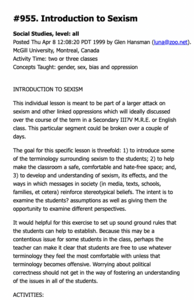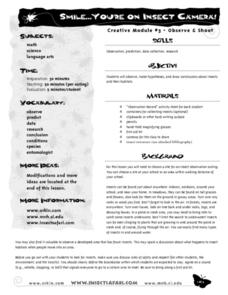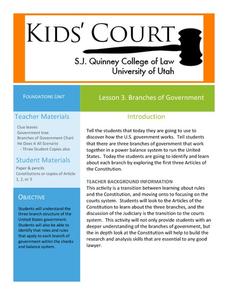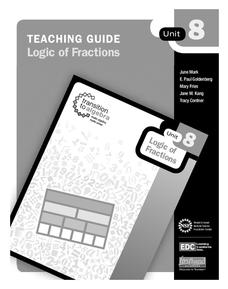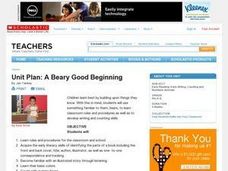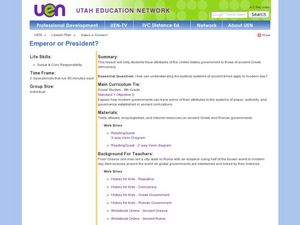Curated OER
A Simulated Journey
Fifth graders experience simulations in order to meet the required Social Studies standards. In this simulation lesson, 5th graders experience a teacher set-up simulation of students being put in the Responsible Thinking Classroom for no...
Curated OER
Dictator For a Day
Students discuss dictatorship. In this Social Studies instructional activity, students review Julius Caeser's rule over Ancient Rome and they elect one student to be dictator for the day. They write about the pros and cons of having a...
Curated OER
Introduction to Sexism
Students develop an understanding of sexism, its effects, and the ways in which messages in society (in media, texts, schools, families, et cetera) reinforce stereotypical beliefs.
Curated OER
E-tiquette
Students develop appropriate ways to communicate via e-mail. They evaluate examples of inappropriate e-mails and create preferable alternatives.
Curated OER
To Kill a Mockingbird Debate
Eighth graders debate issues in the novel To Kill a Mockingbird. In this debate lesson, 8th graders break into three groups and given a view to research and debate. Students must find text to support their ideas and others' ideas.
Curated OER
Signs in the Stitching
Students exercise their creativity by designing an original quilt and a written explanation of its meaning. They use primary sources to develop an understanding of Underground Railroad routes through Indiana.
Curated OER
Smile...you're on Insect Camera!
Students study insects. They go on an outdoor insect outing and look for insects in a variety of places--in the air, under rocks, on leaves, in water, etc. They record information about the insects they find, including habitat, weather...
Curated OER
Look At Those Leaves!
Young scholars collect, observe, sort, and measure leaves. In this leaf lesson plan, students take a walk to collect leaves. They bring the leaves back into the classroom to observe, sort, and measure them. They visit a website to learn...
Curated OER
The Branches of Government
After reviewing and reading about the three branches of US Government, complete this activity with your class. In groups, they will place their "cards" on the board under the correct branch. This lesson is weak and unclear. I'd make a...
Curated OER
Taking a Closer Look at Religions Around the World
Students explore diversity. In this religious studies lesson, students develop their knowledge and understanding of world religions as they use Internet and print sources to research Judaism, Christianity, Islam, Hinduism, Sikhism and...
Curated OER
Keep It Academic
Students study various methods to learn about religion in the classroom. In this religion study lesson plan, students read and visit links to learn about various ways of teaching religion in schools. Students learn the model world...
Curated OER
Minorities Ruled
Young scholars investigate various European political parties with anti-immigration agendas. They examine and write written reports concerning the party goals of exclusion or restriction of immigrants in their societies. Students...
Discovery Education
Fuss About Dust
Dust is everywhere around us; it's unavoidable. But what exactly is dust and are certain locations dustier than others? These are the questions students try to answer in an interesting scientific investigation. Working independently or...
Curated OER
Lesson 3: Branches of Government
Young historians climb through the three branches of the US government in the third lesson of this five-part series. While reading the first three Articles of the Constitution in small groups, children write facts on paper leaves that...
Education Development Center
Logic of Fractions
Before diving into operations with fractions, learners discover the foundation of fractions and how they interact with one another. Exactly as the title says, logic of fractions is the main goal of a resource that shows pupils how...
EngageNY
Multiplying and Dividing Rational Expressions
Five out of four people have trouble with fractions! After comparing simplifying fractions to simplifying rational expressions, pupils use the same principles to multiply and divide rational expressions.
Overcoming Obstacles
Getting Along
Wouldn't it be nice if we could all learn to get along? Middle schoolers review the skills they have learned in other lessons in the course and apply them to a series of activities. They then create posters illustrating their advice on...
TCI
By George!
What better way to learn about George Washington and other United States presidents than with a fun board game? Learners review the accomplishments of Washington's administration through a collaborative board game, as well as draw...
College Board
AP® Computer Science A: Elevens Lab Student Guide
Looking for a project to use in an AP® Computer Science class? Engage learners with a simple solitaire game called Elevens. Through these activities, learners break down the task and write the code for a game. Sign in to your College...
NASA
What's the Frequency, Roy G. Biv?
While all light travels at the same speed, each color in the visible light spectrum contains a different wavelength and frequency. Scholars determine the relationship between frequency and wavelength as they complete the activity. They...
Deliberating in a Democracy
Parental Liability
How many teenagers have wanted their parents to let them make their own decisions? The answer is ... all of them! Scholars investigate where parental liability begins and ends in the eyes of the law. Using case studies and legal...
PBS
Journalism Ethics
As a journalist, would you publish everything you heard or saw? Discuss the ethics of journalism with a lesson from PBS. Young reporters imagine themselves to be the editor of their school's newspaper, and as they read five scenarios,...
Curated OER
A Beary Good Beginning
Students complete first day of school activities. Through instructor modeling and demonstration, they become acquainted with the rules and procedures for the classroom and school. Students create a book of their first day experience.
Curated OER
Emperor or President?
Sixth graders complete a Venn Diagram. In this government comparison lesson plan, 6th graders discuss how rules are similar and different at home, school and in their community. Students learn about the type and structure of the United...




